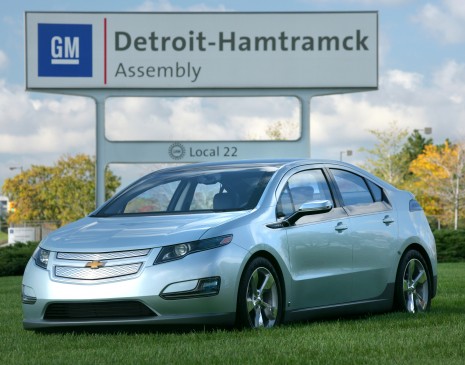It's always good to hear the arguments against electric cars. Some are valid, some are idiotic, and some simply betray a lack of knowledge about how the auto industry really works.
Into that last category may go some comments by one William M. Colton, ExxonMobil’s vice president for corporate strategic planning.
At least 10 years away
In an interview with The New York Times, he commented that electric-car batteries were "not ready for prime time," that a breakthrough to make electric cars practical wouldn't come for at least 10 years, and that gasoline's much greater energy density meant that buyers would always choose cars with longer ranges.

'Oil Barrels, 2008' (detail) by Chris Jordan
In more detail, Colton estimates the cost per kilowatt-hour of electric-car battery packs at $800 to $1,000. That must fall by half or more, he says, before electric cars are practical.
Well, yes, that may be true for many buyers. But basic research will show that the cost-performance of consumer lithium-ion cells--the ones in your mobile phone or laptop--has fallen 6 to 8 percent a year since the first one was introduced in 1989. Most analysts expect the same for large-format automotive cells.

2011 Nissan Leaf, Nashville, October 2010
2020? We're there
That means that by 2020, those costs will indeed have fallen by half.
So, in fact, in just 10 years from last December's launch of such cars as the 2011 Nissan Leaf and 2011 Chevy Volt, electric vehicles could be cost-competitive on purchase price with gasoline cars? (Not to mention the much, much lower cost-per-mile for electrics.)
Gee, that sounds pretty good to us.
Colton also neglects to mention that it will take the industry as much as 10 years to get to the point where even 1 or 2 percent of global vehicle production (now roughly 70 million vehicles a year, perhaps 100 million by then) will be electric cars. That's about the same path that hybrid-electric vehicles followed, by the way.
Really big numbers
Right now, there's debate over whether the U.S. can accomplish President Obama's goal of a total of 1 million plug-in vehicles on its roads by 2015. And that total (over five years) would be less than 10 percent of annual U.S. vehicle production.

2011 Chevrolet Volt outside Detroit-Hamtramck assembly plant
In other words, folks, it's going to take time to build the new infrastructure of lithium-ion cell plants, electric-motor assembly lines, and so forth before we see any significant volumes of electric cars.
Colton seems blithely unaware of that reality.
More efficient gasoline engines, more hybrids
Colton also believes that gasoline engines will become much more efficient, and sales of hybrid-electric vehicles will grow as the cost of their electric machinery and battery packs comes down and more makers launch hybrid models.
And he suggests that replacing coal with natural gas in electric power-generating plants may be the most cost-effective way of all to reduce carbon emissions.
We think he's right on those three points. In fact, we've published numerous articles saying essentially the same thing (less so on the power-plant issue, since this is a site about cars).

'Why We Hate the Oil Companies,' by John Hofmeister
Is it really fear of the plug?
But we note that everything he approves of has a fossil-fuel component, whether it's gasoline or natural gas.
And we wonder whether he's emblematic of an oil industry that has finally acknowledged that efforts to control carbon emissions may be inevitable.
But more efficient gasoline cars and hybrids still require gasoline. Plug-in cars don't.
Sure, the electricity that powers them may be generated by burning coal, but it may also come from those efficient natural-gas plants, and increasingly from renewable sources like wind and various forms of solar power.
So we have to wonder if it's really the prospect of battery electric vehicles that use no gasoline at all, and potentially nothing at all out of an oil well, that really scares at least one oil-company executive.
What do you think? Leave us your thoughts in the Comments section below.
+++++++++++













